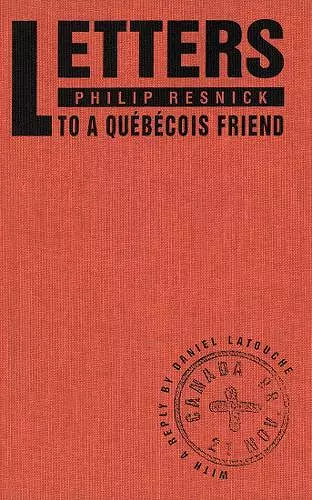Letters to a Québécois Friend
Daniel Latouche author Philip Resnick author
Format:Paperback
Publisher:McGill-Queen's University Press
Published:1st Jan '90
Currently unavailable, our supplier has not provided us a restock date

Resnick, a leading Canadian nationalist, argues that English-Canadian attitudes toward Quebec have changed fundamentally since the November 1988 election. Quebec has become too selfish, he says, and English Canada feels betrayed by Quebec's refusal either to recognize or take seriously the desires of the rest of the country. He suggests that Quebec reconsider the social values it once supported, values which are in opposition to the market-oriented Canada-US Free Trade Agreement. Resnick argues that this agreement will only weaken the Canadian state, as would the Meech Lake Accord. Canada's move toward the right, politically and economically, is, for Resnick, exacerbated by Quebec's stubborn self-interest. He argues that the consequences of moving to the right, such as we have seen in the US and Great Britain, should concern both English Canada and Quebec; only by working together can Canada as a whole begin "to formulate more humane and compelling alternatives for the coming decade." Daniel Latouche makes it quite clear in his reply that the Quebecois are tired of having to justify themselves, their distinctiveness, and their support of Free Trade. While English-Canadians may think they have been betrayed by Quebec, he says, it is only because they have not looked at the issues from a Quebecois perspective. When vying for its share of political power, says Latouche, Quebec is only playing by the rules it has learnt from English Canada. And Free Trade, he points out, was an initiative originating in Ontario and the West. Latouche asserts that Quebec's response to the Supreme Court ruling on Bill 101 was a legitimate use of the Canadian constitution and asks whether it is because it was Quebec that made use of this clause that it was condemned. The Supreme Court ruling, Latouche argues, protected commercial interests "thus accelerating the judicial integration of Canada within the American legal culture." All Quebec did was make use of an escape clause to protect itself. Resnick suggests that since the Quiet Revolution there has been an increased responsiveness on the part of English Canadians to Quebec and its demands. But Latouche has no time for this argument: "Do you mean that every time we manage to have a share of what all Canadians are entitled to, these are mere bones you...
"[This book] is intelligent and passionate. Moreover, it highlights an important shift in thinking within the left-wing nationalist forces in English Canada ... Que be cois nationalism is losing important allies in English Canada." Keith Banting, School of Public Administration, Queen's University.
ISBN: 9780773507777
Dimensions: unknown
Weight: unknown
136 pages